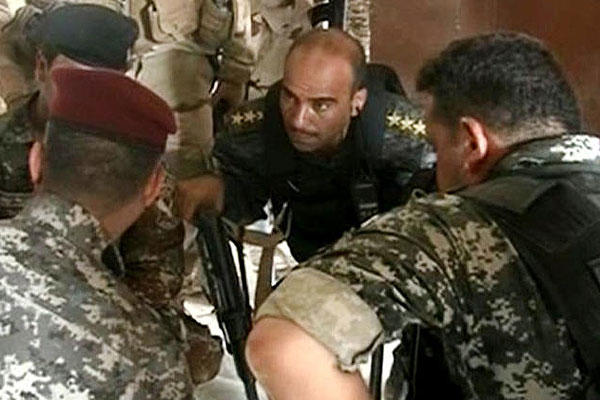The Defense Department has no current plans to conduct airstrikes or speed up arms shipments beyond what is already in the pipeline to bolster collapsing Iraqi security forces against advancing insurgents, Pentagon officials said Thursday.
"We are completely aware of the gravity of the situation – I'm not going to soft-pedal it," said Army Col. Steve Warren, a Pentagon spokesman. However, he did not specify any additional military aid other than training in Jordan for a small unit of Iraqi troops.
"Nothing is being held up" from the existing $15 billion program of arms sales to Iraq that includes Hellfire missiles, Scan Eagle reconnaissance drones, small arms, thousands of tank rounds and millions of rounds of small arms ammunition, Warren said.
The current arms package includes several Apache attack helicopters and two F-16 fighters that were scheduled to be delivered later this year if the U.S. can be sure that they won't fall into enemy hands, said a Pentagon official who spoke on background.
Security issues were "front and center" in the sale of weapons systems such as the F-16 and the Apache, the official said. "Security of those weapons from the beginning of the sale itself remains the foremost consideration of the U.S. government," the official said.
Pentagon officials said that the ISIS insurgents likely have commandeered Humvees and U.S.-made small arms that were abandoned by the fleeing Iraqi army, but they disputed ISIS claims on social media that more high-end equipment has also fallen into rebel hands.
Images of a U.S. Black Hawk helicopter and a Russian missile launcher captured by the U.S. in the 2003 Iraq invasion were photoshopped by ISIS and were "complete fabrications," the Pentagon official said.
Despite the Pentagon disclaimers on increased military support, President Obama said he was considering some "short term, immediate things that will need to be done militarily" to shore up the Baghdad government.
However, Obama said he was more concerned about Maliki following through politically on pledges he made to the U.S. to heal the rift between his predominately Shia government and the estranged Sunni communities of western Iraq.
Following a White House meeting with Australian Prime Minister Tony Abbott, Obama said "I don't rule out anything because we do have a stake in making sure that these jihadists are not getting a permanent foot hold in either Iraq or Syria, for that matter."
"Our national security team is looking at all the options, but this should be also a wake up call for the Iraqi government that there has to be a political component to this," Obama said.
Pentagon officials acknowledged being stunned at how swiftly the ISIS insurgents took Mosul, Tikrit and other areas north and west of Baghdad, and also at how swiftly the Iraqi forces trained at a cost of $25 billion by the U.S. had collapsed and fled.
The autonomous Kurdish Regional Government (KRG) issued statements announcing that its forces, called the "Peshmerga," had pushed the insurgents out of the oil town of Kirkuk and were prepared to protect the refugees fleeing north to the Kurdish region.
In the areas that fell to ISIS, "the Iraqi security agencies and ministries have been incapable and soldiers and employees were only interested in collecting their salaries," Kurdish Lt. Gen. Jabbar Yawar said in a statement.
Yawar named three Iraqi generals who had fled to the Kurdish region along with two Iraqi pilots who abandoned their planes. He said all were put on a Kurdish flight back to Baghdad.
The KRG had repeatedly warned Maliki of the ISIL threat and urged cooperation between Iraqi and Kurdish forces, but "Baghdad did not heed the KRG's warnings and now, unfortunately, our predictions have come to pass," Yawar said.
-- Richard Sisk can be reached at richard.sisk@monster.com























